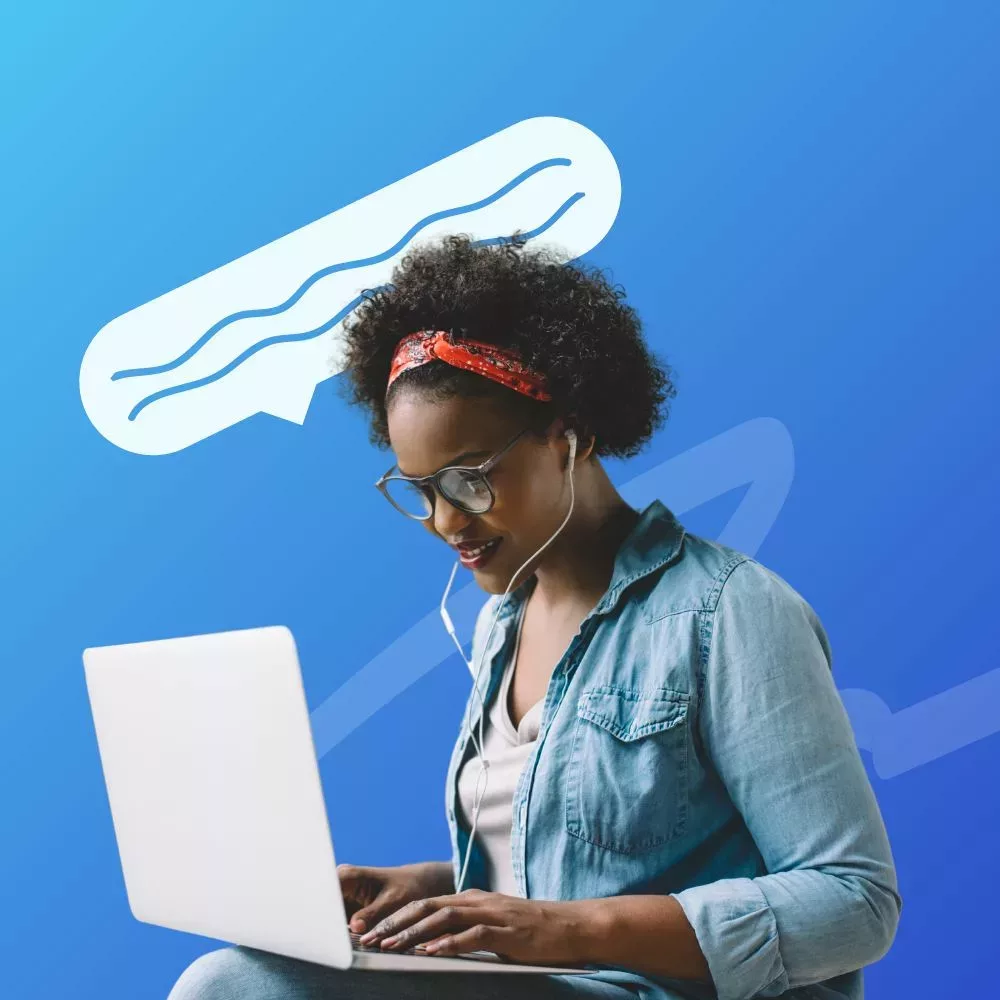The Mock Interview: What It Is & How to Prepare

You’ve probably come across the term “mock interview” during your job search, but what exactly does that mean, and how can it give you an edge in today’s competitive job market? Use this comprehensive guide to learn what a mock interview is and how to use it as a secret weapon to land your dream job. Whether you’re a new graduate or an experienced professional looking to transition into a new role, mastering the art of the mock interview can elevate your confidence, refine your responses, and set you up for success.
What is a mock interview?
At its core, a mock interview is a simulated job interview. It’s a practice session designed to mimic a real-life interview scenario. The goal? To prepare you for the real deal. But let’s dive a little deeper to explain the benefits fully.
Imagine this: You have a big exam coming up, and you’re allowed to take a practice test beforehand. Although the questions aren’t exact, they provide insight into the structure, the type of questions you might encounter, and how best to approach them. That practice test is to your exam what a mock interview is to your job interview.
The first component of a mock interview is pairing up with the right partner—a career coach, a friend, or even an experienced professional from your desired industry. They’ll act as the interviewer, posing questions you might encounter during the real interview. At the end of this session, they will provide feedback on your responses, body language, and overall interview demeanor.
Essentially, the process creates a unique opportunity to refine and perfect your interviewing skills. It’s a rehearsal for the big day, so you can put your best foot forward when it counts the most.
What to expect in a mock interview
When facilitated correctly, this simulation closely mirrors a natural interview setting. From the greeting at the start to the final handshake (or the digital sign-offs in virtual setups), every aspect is designed to emulate the genuine experience. Dress as you would for an actual interview to be mentally and physically prepared for the occasion – including everything from your attire to any materials or portfolios you might need to present.
Your interviewer will come prepared with questions tailored to your target job or industry. Some might be general, while others may dive deep into technical specifics or situational challenges. One of the reasons they are so helpful is that they cover a broad spectrum, prepping you for unexpected curveballs and more predictable topics.
As the session unfolds, remember that this is a learning opportunity. You might be thrown off by certain questions or stumble over answers, even if you’ve rehearsed them a dozen times. That’s okay! It’s all part of the process.
After the questioning, expect feedback, which is one of the most valuable aspects. Your interviewer will share insights into your strengths and areas for improvement and may even offer techniques or strategies to articulate your points better. They’ll note everything from the content of your answers to your non-verbal cues, providing a comprehensive assessment.
Benefits of mock interviews
Increased confidence
One of the most noticeable benefits is the significant boost in confidence. Answering questions, adapting your answers, and receiving feedback will help you sound natural and comfortable. When you walk into the actual interview, you do so with the assurance that you’ve faced these challenges before, giving you an edge in the confidence department.
Constructive feedback
Mock interviews offer a safe space to receive feedback. It isn’t about critique for critique’s sake but genuine, constructive feedback. From the specifics of your answers to your body language and even the tone of voice, you get a complete picture of your interview performance. This feedback is a roadmap, showing you areas of improvement and highlighting your strengths.
Reduced anxiety
Fear is reduced by familiarity. Experiencing an interview’s format, rhythm, and style in a mock setting naturally reduces the anxiety associated with the unknown. You’ve been through the motions, tackled the tough questions, and perfected your responses, so when the real interview comes around, it’s just another session, only with higher stakes.
Practice in real-time
Reading about potential questions or rehearsing in front of a mirror is one thing, but nothing beats practice. You’ll have to think on your feet, adapt to unexpected questions, and learn to maintain composure under pressure. Think of it as a real-world experience without the real-world consequences.
Refining your personal story
Every job candidate has a story – a unique blend of experiences, skills, and aspirations. Mock interviews give you the platform to weave and refine your narrative so that when asked, “Tell me about yourself” or “Why this role?” you’re able to respond with a compelling, concise, and memorable story. It should be relevant to the job at hand, so allow yourself to be flexible. Rather than a one-size-fits-all story, your narrative should evolve with each new opportunity.
How to set up a mock interview
Identify the right interviewer
Choosing who will conduct your unofficial interview is pivotal. Make every effort to pair with someone who has experience in the hiring process or is familiar with your target industry. Their feedback will be invaluable since they understand what potential employers are looking for. If you’re in school or college, your career center might offer mock services, which can be an excellent starting point.
Set clear objectives
Consider your specific goals when preparing for an interview. Are you looking to improve your answers to behavioral questions? Do you want to practice handling stress questions or want feedback on your body language? Sharing these objectives with your interviewer will ensure the session is tailored to address your concerns and areas of growth.
Choose a suitable venue
The location of the interview plays a significant role in setting the tone. If you are meeting in person, a quiet, professional setting like an office or study room is ideal. When done virtually, be sure you have a stable internet connection, a clear camera, and a distraction-free background. The more you can mirror a real interview environment, the better prepared you’ll be.
Provide context and background
To make the session as realistic as possible, share your resume and the job description with the interviewer in advance so they can create questions that represent what you can expect to be asked.
Schedule a feedback session
While the exercise itself is instrumental, the feedback that follows is where the true value lies. Allocate ample time post-interview for a thorough feedback session – it will allow you to understand your strengths and areas for improvement and gain insights into aspects of the interview you might not have noticed. Make sure to take notes and keep track of what is discussed during the session so that you can refer back to them later.
Adopt the right mindset
Approach your mock session with the seriousness and professionalism of an actual job interview. Doing so will help you immerse yourself in the experience, allowing you to reap the maximum benefits. Come prepared, show enthusiasm, and ask questions to show your engagement and curiosity. Remember, this is a learning opportunity, so embrace the feedback, refine your skills, and grow confidently.
How to prepare for a mock interview
Do your research
Spend sufficient time researching the company or industry you’re targeting. Don’t just glance at the company’s website; dig into the history, mission, recent news, and company culture. Visit their social media accounts as well to get a sense of the day-to-day work environment. Prepare a list of points to mention during the interview that align with the company’s values and objectives.
Know your resume inside out
Your resume is more than just a document—it’s a snapshot of your professional journey. It should be customized to the job you’re applying for and highlight your experiences and achievements. You must be familiar with every detail, from job roles to projects. Expect questions around any point you’ve mentioned, and be prepared to discuss and elaborate on your experiences and skills.
Need help tailoring your resume? We suggest using a professional resume service like BeamJobs!
Craft and refine your answers
While you want to avoid sounding rehearsed, having a foundation for common interview questions is crucial. Develop your responses to staples like “What are your strengths and weaknesses?” or “Describe a challenging situation you faced at work.” Use the STAR (Situation, Task, Action, Result) method to structure your answers effectively. Practice saying your answers out loud to be sure they provide a clear picture of why you’re the best candidate for the job.
Practice your non-verbal communication
Communication goes beyond words. Body language, eye contact, posture, and a firm handshake all play pivotal roles in how you’re perceived. Practice your interview body language by sitting confidently, maintaining good eye contact, and ensuring your gestures and expressions align with your words. Also, don’t forget to smile! A genuine smile can go a long way in showing employers how eager you are for the job.
Prepare questions for your interviewer
At the end of most interviews, you’ll have a chance to ask questions. Take this opportunity to demonstrate your genuine interest in the position by bringing a list of insightful questions about the company, team, or role… Be sure they are open-ended and cannot be answered with a simple yes or no. Test these questions to gauge the interviewer’s response and adjust accordingly.
Dress the part
While it might be a simulation, dressing as you would for the real interview is essential in setting the right mindset. Choose professional attire that aligns with the company culture you’re targeting. Make sure everything fits beforehand and that you’re comfortable in your clothing. It’s not just about looking the part—it’s about feeling it too.
A safe bet for most job interviews is to wear a suit, but if you’re applying to a more casual workplace, you can opt for dress pants and a nice blouse or a dress. Keep your jewelry and makeup minimal, and make sure your hair is neat and out of your face. Avoid wearing too much perfume or cologne; you don’t want to overwhelm the interviewer with a strong scent.
Frequently asked generic interview questions to practice
Getting a sense of commonly asked questions can be a real game-changer, allowing you to practice and perfect your answers. Here’s a list of frequent interview questions that you should consider practicing:
- Tell me about yourself.
- Where do you see yourself in 5 years?
- Why are you looking to leave your current job?
- What are your strengths?
- What areas of improvement or weaknesses can you identify in yourself?
- How would your colleagues or supervisor describe you?
- Why should we hire you?
- What are you looking for in terms of salary?
- What is your preferred work environment?
Remember, while having thought-out responses to these questions is essential, it’s equally important to be genuine and authentic in your answers. Employers can usually tell when responses are overly rehearsed or insincere. Practicing these questions in a simulated interview can help you achieve the right balance between preparation and authenticity.
For additional practice, check out our AI interview question and answer generator!

